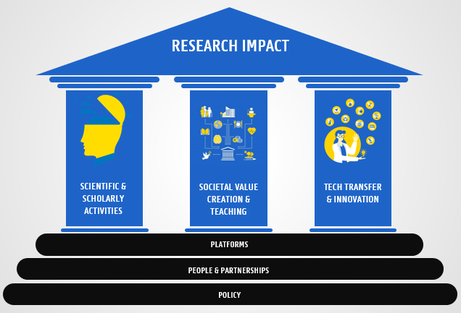Value creation and impact of research
What's in a name?
Impact is the effect that research has in society. It is the changes we can see (demonstrate, measure, record) in our sphere of life (society, economy, environment) that result from (caused by, contributed to, attributable to) research and scientific knowledge. Here, we distinguish between 'academic or scientific impact' (limited to the knowledge contribution of research to a field of study within academia) and 'socio-economic impact'. Both forms are relevant for both fundamental and applied research, as well as for various disciplines.
Impact manifests itself in many ways (cultural, societal, technological, political, quality of life and health, economy, ...), can be far-reaching or limited, local or global, short- or long-term, be measurable and/or quantitative or just conceptual and very difficult to express. Impact can be linked to a specific project but also to broader and gradual knowledge building. With impact, one mainly wants to achieve benefits for society but impact can also be negative.
Result versus process
Value creation (in Dutch ‘valorisatie’) of research is the process that can lead to impact and can be interwoven throughout the life cycle of research (ranging from which and how the research is conducted to the dissemination or commercialisation of the results).
While researchers fulfil their role in the process by planning value creation (e.g. using so-called pathways to impact), there is also a big role for other stakeholders. A process of 'uptake' (effective use by users of the new knowledge/product/innovation) is often an important prerequisite for achieving impact.
Ghent University approach
At Ghent University we want our research and researchers to have impact. For this aim we have introduced infrastructure, human capacity, and policy – because creating an impactful research environment and impact literate researchers needs interventions on different levels and collaboration across the university. In assessing and rewarding impact Ghent University's focus is on the process, i.e. valorisation or value creation (planning, impact pathway(s), interactions).
- Two complementary policy and support frameworks make up the spectrum of socio-economic value creation and impact. Both are needed to address the broad approach.
- Besides these, also frameworks for teaching and scientific publishing exist.
Some specific initiatives:
- The vision and ambition in the field of research go hand in hand with the way research and researchers at Ghent University are evaluated. Ghent University organises evaluations in such a way that they stimulate the quality and impact of research, appreciate a diversity of research activities, and promote good research practices.
- Integrating value creation and impact into the dimensions of teaching and research, as illustrated by the career progression model for professors
- Creating capacity through the establishment of IOF Business Development Centres and IDC - Interdisciplinary Research Centres aimed at Societal Impact
- Providing funding through the Industrial Research Fund and the Societal Value Creation Fund
Researchers of Ghent University find more information and support on socio-economic value creation and impact on the intranet.
